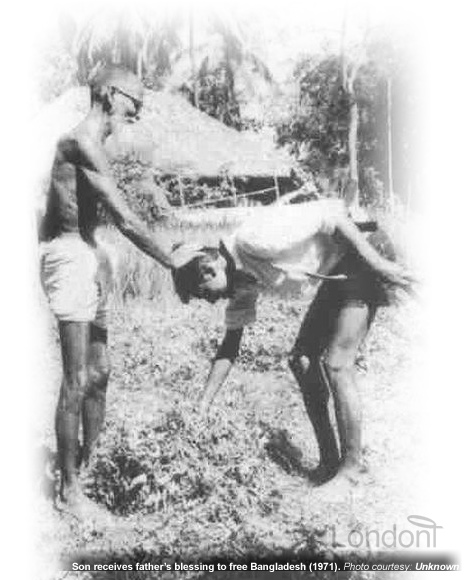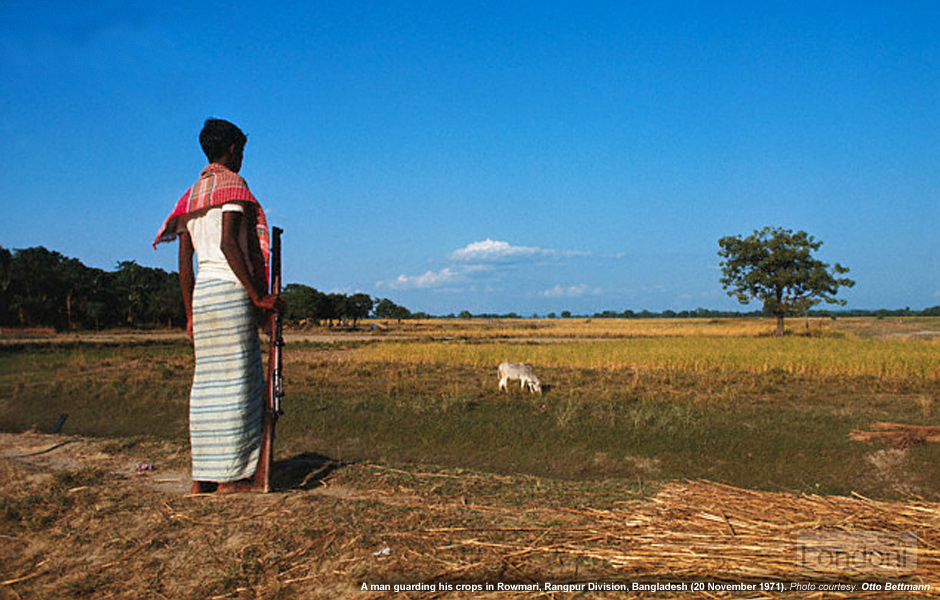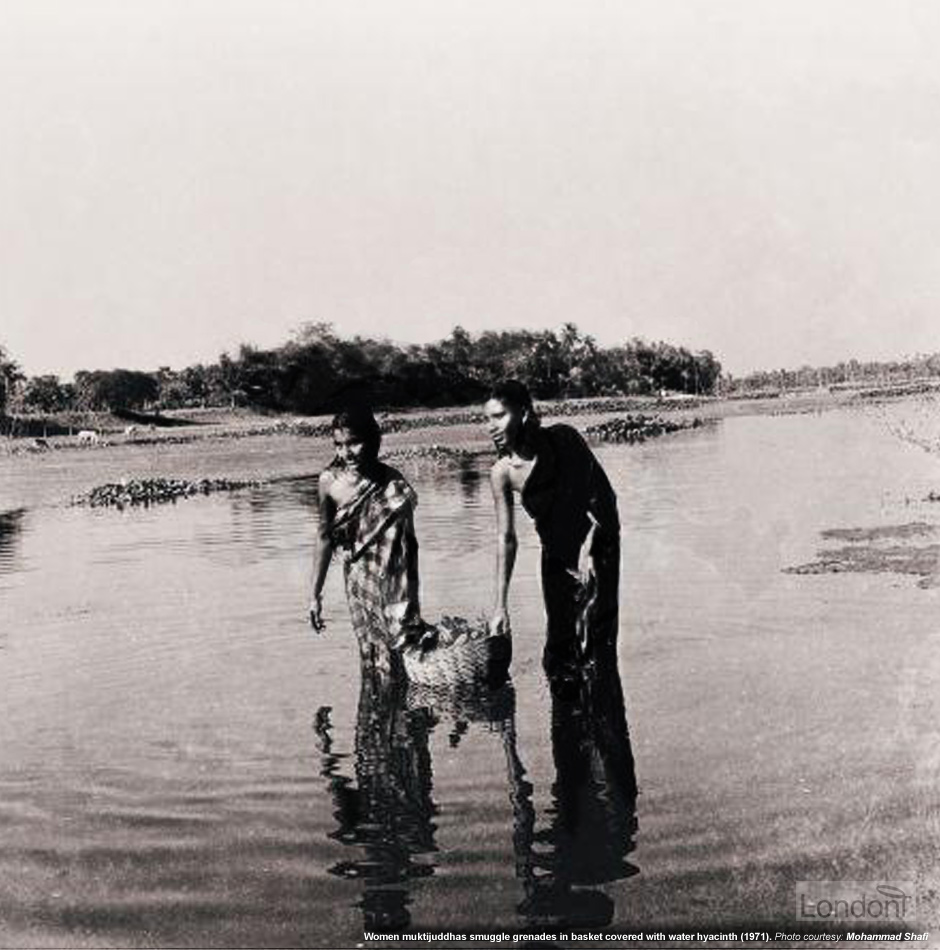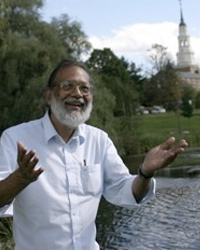
Gono Juddho (People's War)
Last updated: 5 October 2017 From the section 1971 Muktijuddho
Discover amazing untold stories!!
We have a large section dedicated to the sacrifices the ordinary people made to free Bangladesh. You can read these articles and watch the videos here.
During 1971 villagers, students and civilians with no military background took up arms without a second thought. Until then the Bengali freedom movement had no organised platform like Army, Navy or police. However, very little focus have been placed on this spontaneous uprising whilst documenting the Bangladesh Liberation War. The contribution of these 'ordinary people', their suffering, and their will to survive have been engulfed by the military and political narrative. The gallant effort of students, teachers, women, farmers, daylabourers, officers, doctors, engineers, scientists, journalist and people from all other walks of life have usually been limited to few passing paragraphs in books.
The war the rich and educated fought was not the same that the poor and uneducated had to fight. The former fought the war from the political point of view of forming a state. But the latter, on whom the war had been almost imposed, endured it. But many a brave fighter emerged from among them.
As the aspirations and compulsions of the two classes were not identical, their experiences of the war, as my ground level study shows, are also different.
A lot has been written on the experiences, both empirical and political, of the educated middle class. But there has hardly been any attempt to document the experiences of the vast majority of the downtrodden, who were marginalized as soon as the war was over.
Afsan Chowdhury, eminent Bengali historian and journalist
It was the great dedication, sacrifice and do-or-die mentality of the common man which saw the spirit of the Liberation War did not die out under deluge of Pakistani attack. Nevertheless, such is the gap and distortion in the account of the Muktijuddho that even highly educated boys and girls occupying responsible and prestigious positions often request to tell the 'real' history of Liberation War. Even they are confused about what type of war it was. This is high time to let them know the real history through recognition and evaluation of the sacrifices made by people from all sphere of life.
War history has several dimensions. There are military, social, political, gender and other aspects. However, for a long while most histories of wars have focused on the role of the military or armed aspects as the dominant ones ignoring other dimensions. Given the historical background of nations where military conflict was considered the only legitimate way of resolving arguments, this is natural. It was also a very male centered imagination driven by individual narratives fuelling notions of physical bravery as the prime mover of history. This uni-focal notion has begun to change in the last few decades as research has shown that a war is a far more inclusive event where even military acts are also dependent on socio-economic factors. Without a comprehensive narrative that includes the role of various segments, history writing is very incomplete.
In case of 1971 this exclusion of other aspects is even more significant or problematic because this war had a much wider participation of people than many other wars. Militarily, it was both a resistance war which happened from within and later was a frontal war which happened from without. Perhaps some similarity can be found with the French situation in WW11 but the nature of resistance both by armed forces and paramilitaries, the role and pressure of refugee presence in India, international politics, the involvement of ordinary people in various forms of conflicts and survival strategies have made it a reasonably unique narrative.
When we read accounts of this war, we find most are descriptions of conflicts or extreme suffering and death. But many of these works are not very credible and even a rudimentary review shows that many wouldn't pass even the basic test of authenticity. These have become either heroic or pity seeking narratives that are closer to fiction in some cases. As it's in the political space where these works are played out, these pretend-histories are officially upheld because they uphold the official position as a quid pro quo. This practice has damaged the construction of a mature national history that was largely fought in the broadest sense by ordinary people.
Putting the ordinary person - the peasant, the farmer, wage labourer, woman- as the central focus of the war narrative poses certain problems of socio-political power management in Bangladesh. If the war is imagined as a broader participation than that is done now, the demand for sharing of state power with the people who are being given the central role becomes far more pressing. Thus the war can't be imagined as a product of participation of all but has to be only of those who became the leaders of the subsequent independent state.
This has resulted in a collection of many tales, narratives, myths etc that are not always located in facts and many such 'facts' survive because nobody wants to challenge them or are not comfortable challenging them.

Different sort of sacrifice
When you travel through Bangladesh you can hear endless stories which resulted from the events of 1971. From the multitude of complex emotions that was present in 1971 stemmed different actions. Be it in their brave patriotic stance to free their land, from fear of death, from the need to survive, from confusion over the rapidly declining situation or to give the younger generation a better future - or a mixture of all the above - no two stories are the same. Each new story brings with it a new emotion, a new information, a new twist. But the common thread that binds all these stories together is that at its heart remain the sacrifice of the ordinary people.
The gruel kitchen was 20-25 minutes walk away. It was located in a big dilapidated rice mill. All our food was cooked there... Many had to give their lives for this job.
There's the heart-touching story of Abdul Mannan of Khaghar in Brahmanbaria who accepted the fate of a landless farmer by giving up his only piece of land for burial of the villagers massacred by the Pakistani Army on 9 October 1971.
I could have been one of them. What would I have done with the land if I was killed? I thought [Allah] the Almighty will take care of me so I gave my land to bury the dead.
Other amazing incidents include that of Karuna Begum who fought in the guise of a man at Nolchira of Gournadi and lost a leg in the process. Or that of Rebati Mahali, an indigenous tea garden labourer in Sylhet, who was tortured to death by the Pakistan Army for saving women and children from a fire, set by the army. Or that of Aminul Haque, who was among the 350 people who died of exhaustion from forced labour imposed upon them by the Pakistani Army to build the Saidpur Airport in 1971. Or that of Hasan Ali, a teenage freedom fighter who was killed by the Pakistani Army after he was brought to a military camp by a group of razakars. Such was the heroics that the young man showed in the face of death that even Pakistani Major Siddique Salik, who was at the camp at the time, gave an account of Hasan Ali's heroics in his famous book "Witness to Surrender".
Such was the impact of ordinary people's contribution that Colonel Quazi Nooruzzaman who commanded Sector 7 (Dinajpur-Rajshahi-Pabna) refused his Bir Uttam award as he felt it was "people's war". Whilst posted at Bholahat (in Rajshahi division, bordering India) the Colonel came to know about a poor old woman 'who crept out of her hut, found the mines and picked them up' as she suspected that these could be fatalistic for 'our boys'.
If she had been in Britain she would receive George Cross for her contribution to the war. She did this out of love for the boys fighting the war. She got no reward.
In another incident, a woman in nearby Boalia, wife of the local area representative, gave information about her husband that 'proved him to be a liar'. Another woman, the sector commander's wife, Sultana, joined in punishing a freedom fighter after he was caught looting. Sultana, a psychologist, was intent on setting a good example and helping to correct and reform the restless youth. She also worked hard to get the first aid supplies to the guerrillas against all odds.
These incidents, and many more like this, deeply touched the Colonel and he felt it was only correct that he 'shy away' from accepting the Bir Uttam award when countless others - most of whom were unlettered - could perform such selfless act of bravery without anybody's knowledge or acknowledgement.
Everyone is a soldier in a war of liberation, young and old alike… It would be impossible to pick and choose among the many who deserve it.
Major Quazi Nooruzzaman, Sector 7 (Rajshahi-Pabna) Commander, declined Bir Uttam award on the ground that the Liberation War was a people's war and that gallantry awards are given to professional soldiers

'Tahader Juddho'
In 2001 prominent historian and journalist Afsan Chowdhury produced and directed a documentary on the experiences of poor, uneducated village women of the 1971 war. Titled "Tahader Juddho" (Their War), the film is based on a series of interviews and discussions with women who were victimised, who suffered, helped others and also fought in the war. They describe how they risked their lives and those of their families to secretly deliver food, clothes, blankets etc to the Muktijuddhas, hiding them in their homes to save them from watchful razakars and the Pakistan Army, smuggling arms from one place to the other. Tahader Juddho also portrays their life and struggle in later days as their sacrifices have not been recorded in history and nor have they been considered worth mentioning.
With our patriarchal mindset we are more comfortable to think of women only as hapless war victims who at best can appeal to our sympathy but cannot command our respect.
But as the film points out, such heroic acts and unconditional patriotism have not been recognised or mentioned in history books. In the film Chowdhury asks the question: "Weren't these women as much Muktijoddhas as the men who fought the Pakistani army with guns?"
...After the war ended, women – many of whom who had lost their men – husbands, sons, fathers – had to keep on fighting for the survival of their families and households. "And it’s standing on these households that society itself survived in 1971", says Chowdhury.
 Afsan Chowdhury ()
Afsan Chowdhury ()
